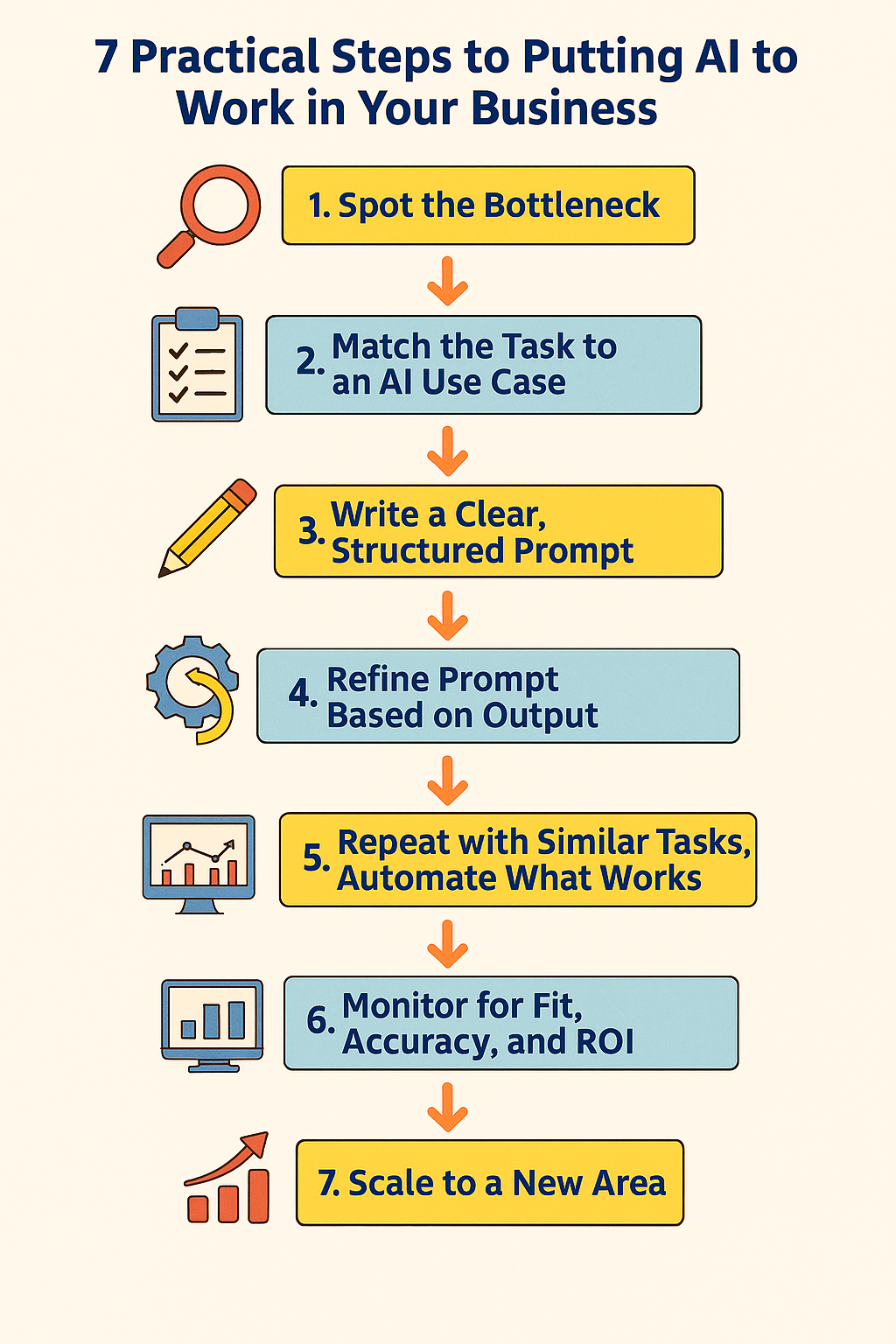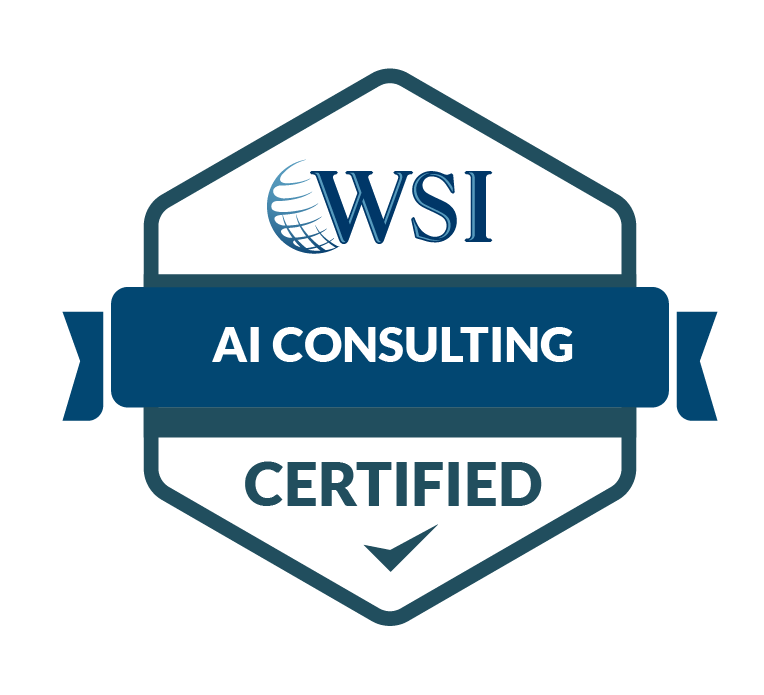
Introduction: From Demos to Daily Use, Putting AI to Work
If you’re like many small business owners in Delaware, Southeast Pennsylvania, or Northern Maryland, you’ve heard the buzz around AI. Maybe you’ve tried putting AI to work on small tasks — had it write a social post, summarize a meeting, draft a long email, or even generate a blog intro.
Those are good first steps. However, here’s the real question: How do you take that one-off experiment and turn it into a repeatable, reliable system that saves time and delivers measurable results?
That’s the point where most owners get stuck. They see potential but stall after the first test run.
This guide is your bridge from experimenting to fully integrating AI into your day-to-day business operations. It builds on what we covered in Innovation Beyond ChatGPT and Choosing the Right AI Tool — but takes you further, into a hands-on framework you can apply immediately.
We call it the 7 Practical Steps to Putting AI to Work a cycle you can repeat across marketing, sales, HR, customer service, admin work, and more.
The 7 Practical Steps to Putting AI to Work
Think of these as a loop, not a ladder. Once you complete Step 7, you’ll circle back to Step 1 with a new process, making your business more efficient each cycle.

Putting AI to Work Step 1: Spot the Bottleneck
Before AI can help, you need to know where the friction is.
Ask yourself:
- How does my team have their time drained every week?
- Are there tasks I keep meaning to delegate but never do?
- What gets delayed or half-done when I get busy?
Examples:
- Ghosting leads because there’s no time to follow up
- Rewriting the same job posts again and again
- Running meetings with no recorded outcomes
- Spending hours summarizing client notes into reports
Real Business Example (Delaware Landscaping Co.):
In spring, quote requests triple. The owner can’t respond fast enough, and delays cost jobs. → Bottleneck = lead follow-up
Action Tip:
Write down three tasks you did last week that:
- Took longer than 30 minutes
- Required little strategic judgment
- Happened every week
- Didn’t directly generate revenue
Putting AI to Work Step 2: Match the Task to a Use Case
Once you identify a bottleneck, link it to a proven AI use case.
| Task Type | Real Business Use Cases |
| Writing | Email replies, blog posts, product descriptions, job ads |
| Communication | Service updates, confirmations, reminders, lead nurturing |
| Summarizing | Meeting recaps, performance reviews, resume screening |
| Planning | Editorial calendars, checklists, onboarding docs |
| Analyzing | Financial summaries, pricing comparisons, customer feedback analysis |
Example:
A dental office in Kennett Square sends appointment reminders manually. The front desk spends 2+ hours a day copying and pasting templates. → Use case: AI-generated reminders, integrated with automation.
Putting AI to Work Step 3: Write a Clear Prompt
Prompts are your instructions. The clearer they are, the better your output.
Advanced Prompt Framework:
“You are a [role or expert type]. Write [format] for [audience] about [topic]. Use [tone]. Include [specifics or context]. Keep it under [word count].”
Before:
“Write a blog post about our services.”
After:
“You are a content strategist for a roofing company. Write a 500-word blog post for homeowners in Wilmington, Delaware, explaining the benefits of roof inspections before winter. Use a friendly but professional tone. Include 3 reasons and a call-to-action.”
Prompt Examples:
- Lead Follow-Up:
“Write a friendly follow-up email for a homeowner in Delaware who requested a landscaping quote yesterday. Keep it short and inviting. Include a scheduling link.” - Job Description:
“Write a job ad for a dental office receptionist in Middletown, DE. Highlight reliability, phone etiquette, and scheduling experience. Keep it under 200 words.” - Content Plan:
“Create a 5-day Instagram content calendar for a family-owned HVAC company promoting fall tune-ups.”
Putting AI to Work Step 4: Review and Refine
AI rarely nails it first try. Your role is to shape the output.
Checklist for Refinement:
- Is the tone right for your audience? → “Make it warmer”
- Is it too long or generic? → “Be more concise”
- Is the CTA strong? → “Rewrite with bullet points”
- Are the facts correct? → “Add an example from our industry”
- Does it sound like us? → “Use our tagline at the end”
Pro Tip: Save 2–3 versions of prompts that work (e.g., casual, sales-driven, professional). Reuse and adapt.
Putting AI to Work Step 5: Repeat with Similar Tasks, Automate What Works
Once you have a winning prompt:
- Apply it to similar tasks
- Build a library of reusable formats
- Automate repetitive processes
Example:
A Kennett Square realtor uses AI to write listing descriptions. Once the prompt is dialed in, she tweaks it for each property — saving hours weekly.
Automation Tip:
If a process saves 15+ minutes a week, it’s worth automating. Tools like Zapier can trigger AI outputs when events occur (form fills, CRM updates).
Putting AI to Work Step 6: Monitor for Fit, Accuracy, and ROI
AI works best when paired with human oversight.
- Check for accuracy, tone, and brand fit
- Track time saved, errors reduced, and conversion rates
- Adjust prompts or processes if performance drops
Putting AI to Work Step 7: Scale to a New Area
Once a process works, expand it.
| Function | Starter Task | Next-Level AI Task |
| Marketing | Blog post drafts | Full content calendars with SEO insights |
| Sales | Quote follow-ups | Proposal generators with client specifics |
| HR | Job postings | Onboarding docs and interview question sets |
| Admin | Meeting summaries | SOP creation from recurring tasks |
| Finance | Expense summaries | Budget simulations with analysis |
Each success adds to your AI-powered operations cycle.
Final Thoughts: Don’t Let the Stack Distract You
The real advantage isn’t the tool itself — it’s how you integrate it into your daily work.
Follow these 7 steps, and you’ll transform AI from a novelty into a dependable business engine.
You don’t need to be a tech expert. You just need to:
- Identify bottlenecks
- Match them to proven use cases
- Write clear prompts
- Refine, automate, and scale
You’re not just adopting AI. You’re building your system — powered by AI.
Need Help Turning Ideas Into Action?
At Famous WSI Results, we help businesses in Delaware, Southeast PA, and Northern Maryland map out AI workflows, build prompt libraries, and train teams to execute.
🔗 Schedule a consultation with Famous WSI Results
Learn More:
- SBA: AI for Small Business — U.S. Small Business Administration guide to AI benefits, risks, and practical integration.
- Forbes: How AI Is Transforming The Small Business Workplace — How AI is reshaping customer service, workflows, and decision-making.
- AP News: Almost All Small Businesses Are Using AI-Enabled Tools — Survey shows 98% of small businesses now use AI-powered tools.



Leave a Reply